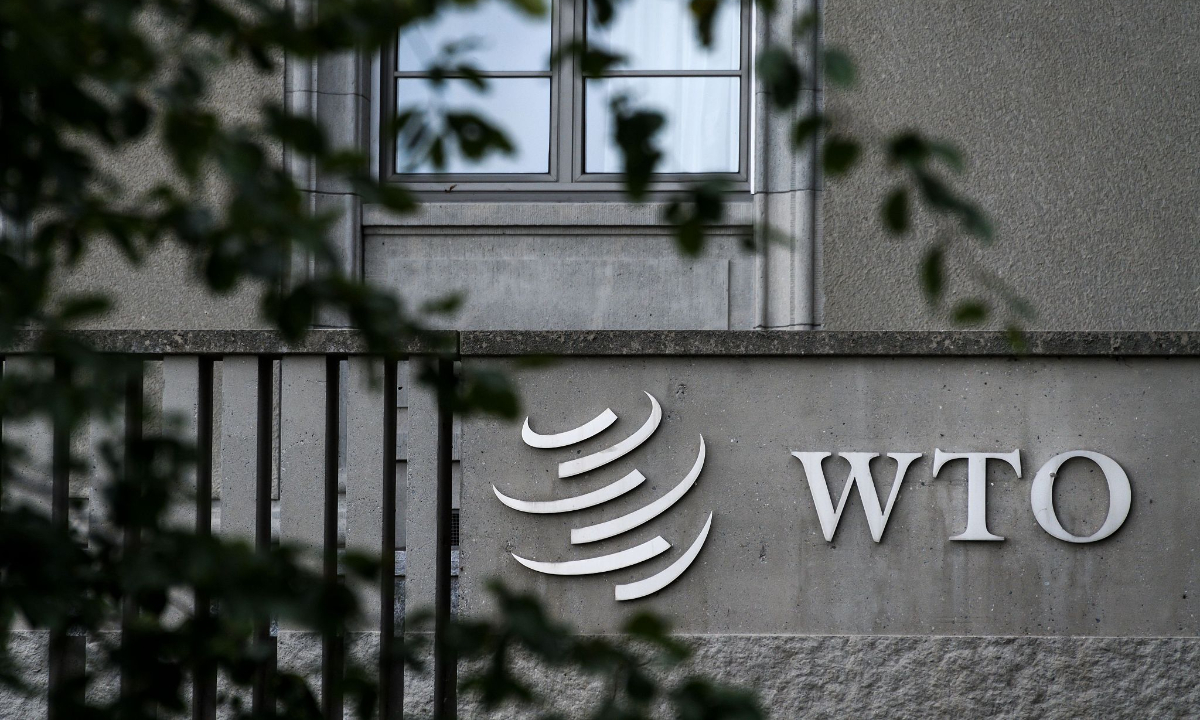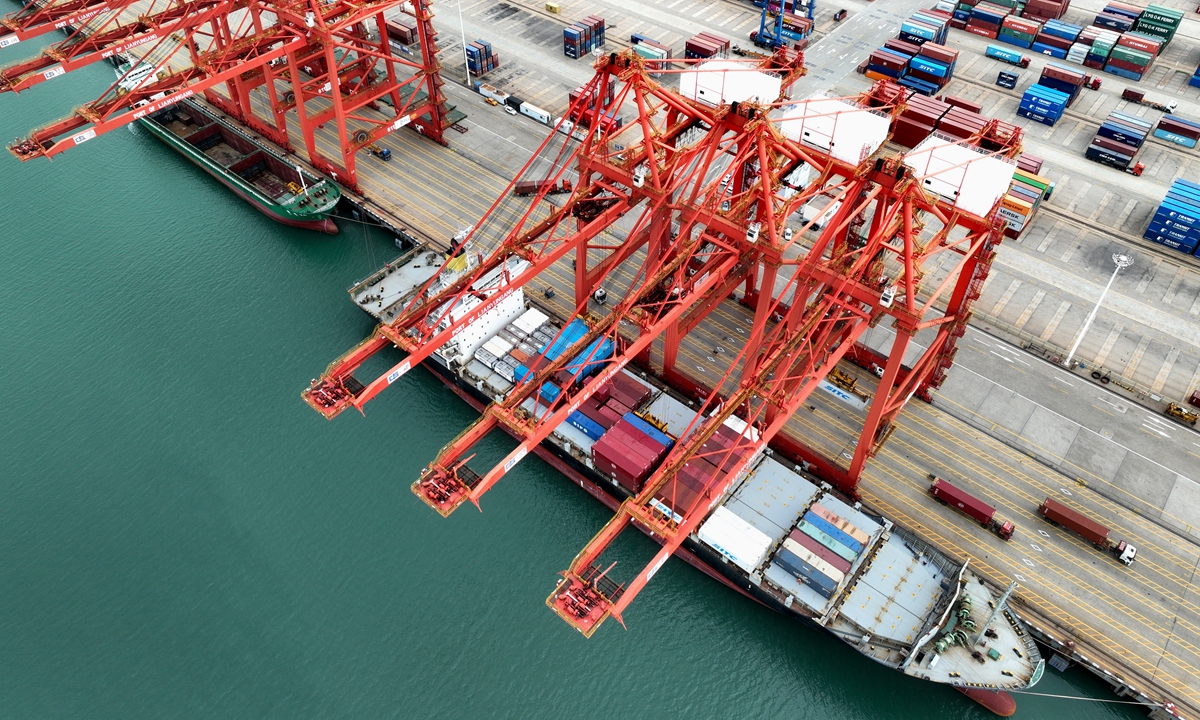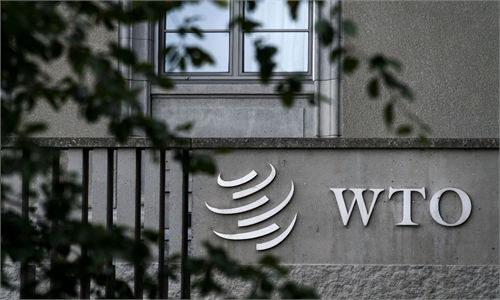US’ new tariffs on tin mill steel unfairly target China, ‘in violation of WTO rules’

A sign of the WTO on its headquarters in Geneva Photo: VCG
The US' announcement of preliminary anti-dumping duties on tin-plated steel imports from three countries based on a single firm's petition unfairly targets China, with a substantially higher tariff rate on its imports, which is likely in violation of WTO rules, Chinese analysts said on Friday.
The latest unilateral and protectionist move from the US government came even as US authorities selectively cited a recent WTO report on Chinese counter tariffs against the US' so-called Section 232 tariffs on steel and aluminum in criticizing China, laying bare the US' hypocrisy and double standards when it comes to international trade rules, analysts noted, adding that such moves will further disrupt global supply chains while damaging the US' own interests.
The US Department of Commerce on Thursday local time announced that it will impose preliminary anti-dumping duties on tin-plated steel imports from China, Canada and Germany, citing a single petition, according to Reuters. In February, a single US steelmaker, Cleveland-Cliffs, initiated a petition and alleged foreign dumping in the tin-plate sector, which has seen several US production facilities close in recent years, according to the report.
While the move appears to cover imports from three countries, China is apparently the main target, as the highest tariff rate was imposed on Chinese exports. The US Commerce Department said the highest preliminary anti-dumping duties of 122.5 percent will be imposed on tin mill steel imported from China, including the country's largest producer, Baoshan Iron and Steel. In stark comparison, imports from Germany will face a tariff rate of 7.02 percent, while those from Canada face a 5.29 percent tariff.
A US Commerce Department official said that China's rates were higher because a lack of cooperation from a major producer in the investigation led to an "adverse inference" determination, while other respondents could not prove that they were independent of the Chinese government.
It is worth noting that the US imports about 14 percent from China, while Canada and Germany together account for about 30 percent, according to data from the US Commerce Department.
Despite the relatively small amount of imports from China, it bears the heaviest anti-dumping punishment, a tax rate as high as 122.5 percent, ten times the combined rate of the other two countries. "This not only goes beyond the scope of competitive anti-dumping investigations but actually violates the principles of free trade, fair competition, and equal negotiation under the WTO," Chen Jia, an independent analyst on global strategy, told the Global Times on Friday.
The steel and aluminum tariffs imposed by the US, as well as the heavy tariffs on tin-plated steel specifically targeting China, are a violation of global trade rules and undermine the principles of the WTO, Chen said.

A cargo ship is berthed for loading and unloading containers at a terminal of the Port of Lianyungang in East China's Jiangsu Province on June 5, 2023. From January to May, the port handled 124 million tons of cargo, up 12 percent year-on-year. Photo: VCG
US hypocrisy on display
The US' latest move which likely violates WTO rules with even more unilateral tariffs is particularly significant, as Washington just recently criticized China over a WTO report on Chinese tariffs in response to earlier US tariffs on steel and aluminum, analysts noted.
After the WTO dispute settlement panel released a report on Wednesday, issuing an opinion in the US' favor, US authorities immediately jumped on the report to smear China. In a statement, the US Trade Representative's Office welcomed the WTO's report and accused China of being "hypocritical" by "both suing the US in the WTO and at the same time unilaterally retaliating with tariffs."
Chinese officials and analysts have dismissed the US' unfounded accusations and highlighted the US' hypocrisy and double standards in using any WTO rules in its favor, while completely disregarding them whenever they are not in its interests.
China's Commerce Ministry said on Wednesday that China's countermeasures against the US Section 232 tariffs on steel and aluminum, which were imposed in 2018, are a legitimate act to safeguard its own rights and interests.
"The US is no longer willing to follow WTO rules, and violates WTO rules whenever it wants by randomly finding an excuse, with 'national security' being the most frequently used," Tu Xinquan, dean of the China Institute for WTO Studies at the University of International Business and Economics in Beijing, told the Global Times. "This clearly is the mindset of a bandit and trade bullying."
In 2018, the Donald Trump administration used "national security" as a pretext to wave its tariff stick, including imposing tariffs on steel and aluminum products, known as the Section 232 tariffs on steel and aluminum, which caused outrage among the international community. Many countries, including China, filed lawsuits in the WTO in response.
In December 2022, the WTO ruled the US Section 232 tariffs imposed on steel and aluminum products in 2018 on the grounds of national security contravened the organization's regulations, recommending that the US bring its actions into conformity. But to date, the US has not carried out any actions to implement the ruling.
Since the beginning of the trade war in 2018, the Trump administration has unilaterally imposed sanctions on countries including China, posing serious challenges to both the legitimate interests of Chinese industries and the fairness of WTO rules, Tian Yun, a veteran economist based in Beijing told the Global Times.
The US has imposed tariffs on steel and aluminum products to maintain its competitive advantage in core manufacturing industries, because in terms of cost-effectiveness, the products do not have a competitive edge over Chinese products in the market competition, Tian said.
However, despite the US government's decoupling moves, it does not have a fully reshaped industrial and supply chain and therefore the move will only result in high prices for essential goods and increase inflation in the US, damaging the US economy, experts said.
As a result of the US' false and short-sighted trade protectionism and move to hinder foreign players, many US steelmakers have found it hard to meet market demand and fear that the additional tariff on tin-plated steel this time will lead to higher costs and inflation.
The Can Manufacturers Institute, a trade group, argued that because US steelmakers currently produce less than half of the tinplate needed for domestic can manufacturing, any new import duties will lead to higher material costs and food prices at a time when inflation remains elevated, Reuters reported.
The unilateralism and protectionism pursued by the US will only hinder global progress and harm its own interests, experts said. They urged the US to lift the sanctions and return to the WTO framework and engage in equal negotiations to pursue mutually beneficial outcomes.
The more frequently and intensively super tariffs are utilized, the greater the imbalance they will create in the global trade system, leading to more severe fluctuations and bottlenecks in the industrial chain, Chen said.


